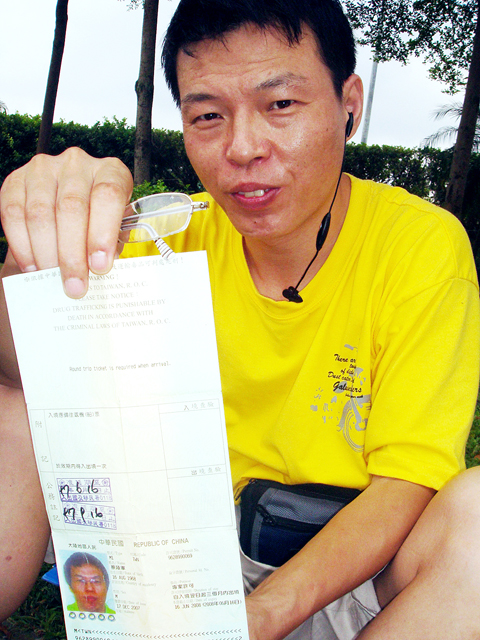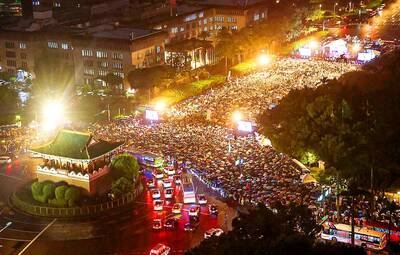A year ago, Chinese dissident Cai Lujun (蔡陸軍) jumped off a fishing boat to seek asylum in Taiwan, looking forward to a warm welcome and a new life.
But what greeted Cai was four months’ detention followed by an endless wait for asylum with no legal residence and a meager living subsidy.
Unable to work in Taiwan or seek asylum in a third country, Cai now regrets having defected to Taiwan.

“Had I known the outcome, even if I was to be beaten to death in China, I would never have come here,” he said recently.
Cai, 40, is one of the five Chinese pro-democracy activists who have arrived in the past four years seeking asylum.
During the Cold War, Chinese defectors were welcomed by Taiwan as “freedom fighters” with cash rewards.
Against the backdrop of warming relations between Taipei and Beijing, the recent arrivals have put Taiwan in an awkward position.
Adding to the complications is the fact that Taiwan has no asylum law and accepts Chinese defectors on a case-by-case basis, preferring to send them to a third country to avoid annoying China.
But no other country has offered to accept the five, as none wants to offend Beijing by accepting Chinese dissidents. Cai’s visits to the US and Canadian representative offices to seek asylum were fruitless.
The Mainland Affairs Council (MAC) has drafted an asylum bill, but it is still pending review by the legislature.
In limbo, a frustrated Cai said he asked MAC officials: “Do you regard me as a human being? If you regard me as a human being, why do you deny me basic human rights? Why don’t you grant me permanent residence?”
“Taiwanese are nice and kind, but the Taiwanese government is the lousiest government in the world,” he said.
Two international agencies — the UN High Commission for Refugees and Amnesty International — have refused to take up the five men’s cases.
Cai and Wu Yalin (吳亞林), 49, who defected to Taiwan in December after serving nine years in prison for criticizing the Communist Party, each receive NT$10,000 per month, which is barely enough to pay rent.
The other three dissidents — Chen Rongli (陳榮利), Yan Peng (燕鵬) and Yan Jun (顏軍) — each receive NT$20,000 per month because of different regulations at the time the stipend was granted.
The five have to renew their temporary residence permits every three to five months, also because of different rules at the time of their arrival in Taiwan.
“Without an ID card, we cannot look for work, go to school or even apply for a cellphone subscription,” said Wu, who worked as a mechanic.
The long wait for asylum in Taiwan and the difficulty in making a living is driving the Chinese defectors to desperate measures.
Cai, Wu and Chen Rongli said they would sue the government for violating their human rights by denying them legal residence.
“If this government does not care about losing face, why should I give face to it?” Cai said.
MAC Chairwoman Lai Shin-yuan (賴幸媛) said the council had urged the legislature to pass the asylum law as soon as possible and asked the five Chinese dissidents to be patient. The legislature is expected to review the draft bill in this session.
Professor Peng Huai-chen (彭懷真) from Tunghai University expressed sympathy for the defectors.
“The importance of Chinese defectors to Taiwan has decreased because of the change of ties between Taiwan and China, but for a democratic country, human rights should come first,” he said.
“If our government cannot grant them permanent residence now as the asylum law has not been passed, it should tell them how much longer they have to wait,” he said.

The Central Weather Administration (CWA) today issued a "tsunami watch" alert after a magnitude 8.7 earthquake struck off the Kamchatka Peninsula in northeastern Russia earlier in the morning. The quake struck off the east coast of the Kamchatka Peninsula at 7:25am (Taiwan time) at a depth of about 19km, the CWA said, citing figures from the Pacific Tsunami Warning Center. The CWA's Seismological Center said preliminary assessments indicate that a tsunami could reach Taiwan's coastal areas by 1:18pm today. The CWA urged residents along the coast to stay alert and take necessary precautions as waves as high as 1m could hit the southeastern

FINAL COUNTDOWN: About 50,000 attended a pro-recall rally yesterday, while the KMT and the TPP plan to rally against the recall votes today Democracy activists, together with arts and education representatives, yesterday organized a motorcade, while thousands gathered on Ketagalan Boulevard in Taipei in the evening in support of tomorrow’s recall votes. Recall votes for 24 Chinese Nationalist Party (KMT) lawmakers and suspended Hsinchu City mayor Ann Kao (高虹安) are to be held tomorrow, while recall votes for seven other KMT lawmakers are scheduled for Aug. 23. The afternoon motorcade was led by the Spring Breeze Culture and Arts Foundation, the Tyzen Hsiao Foundation and the Friends of Lee Teng-hui Association, and was joined by delegates from the Taiwan Statebuilding Party and the Taiwan Solidarity

Instead of threatening tariffs on Taiwan-made chips, the US should try to reinforce cooperation with Taiwan on semiconductor development to take on challenges from the People’s Republic of China (PRC), a Taiwanese think tank said. The administration of US President Donald Trump has threatened to impose across-the-board import duties of 32 percent on Taiwan-made goods and levy a separate tariff on semiconductors, which Taiwan is hoping to avoid. The Research Institute for Democracy, Society, and Emerging Technology (DSET), a National Science and Technology Council think tank, said that US efforts should focus on containing China’s semiconductor rise rather than impairing Taiwan. “Without

The National Museum of Taiwan Literature is next month to hold an exhibition in Osaka, Japan, showcasing the rich and unique history of Taiwanese folklore and literature. The exhibition, which is to run from Aug. 10 to Aug. 20 at the city’s Central Public Hall, is part of the “We Taiwan” at Expo 2025 series, highlighting Taiwan’s cultural ties with the international community, National Museum of Taiwan Literature director Chen Ying-fang (陳瑩芳) said. Folklore and literature, among Taiwan’s richest cultural heritages, naturally deserve a central place in the global dialogue, Chen said. Taiwan’s folklore would be immediately apparent at the entrance of the